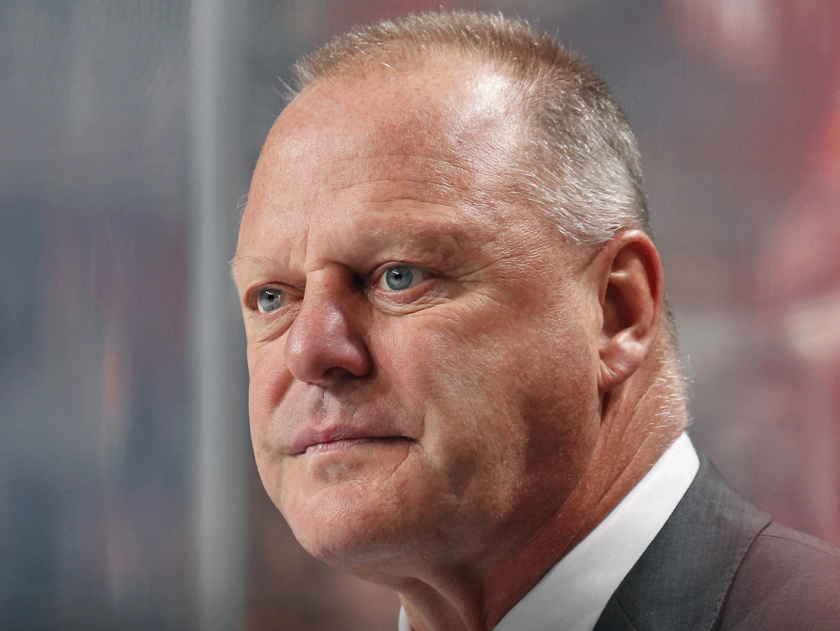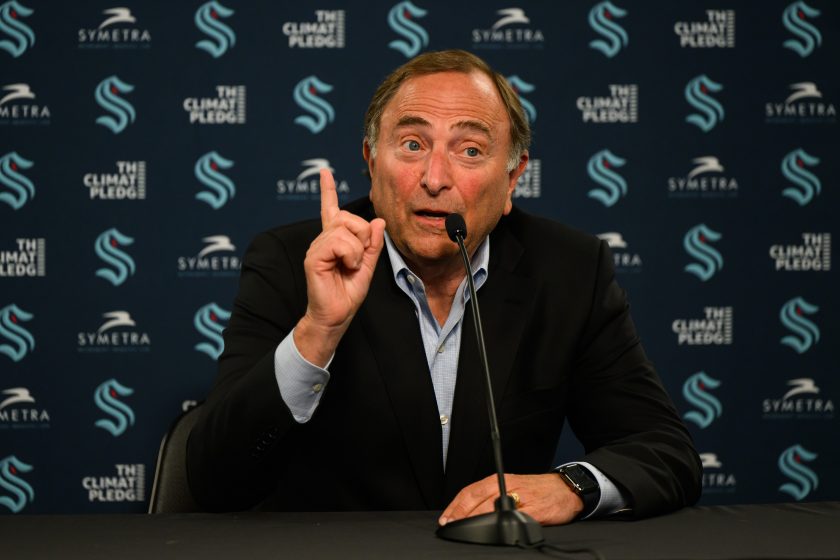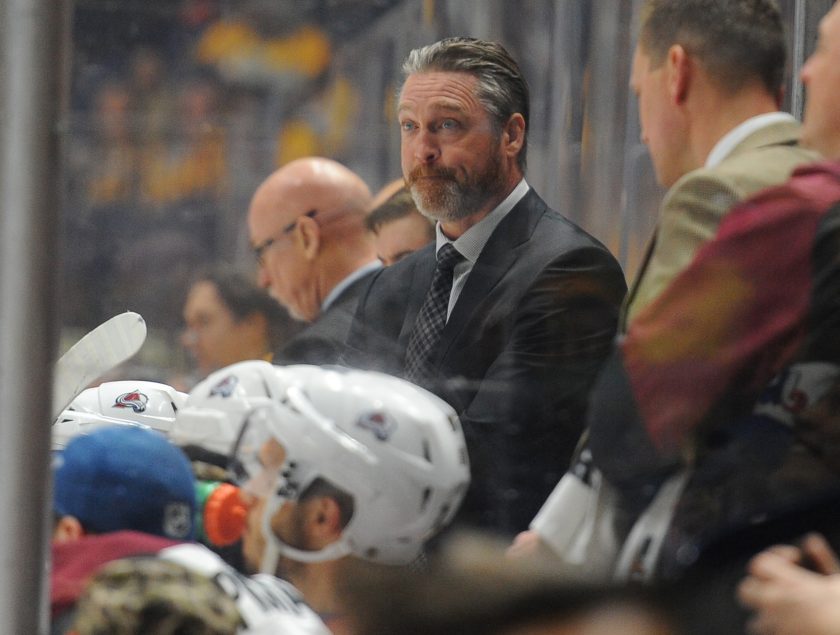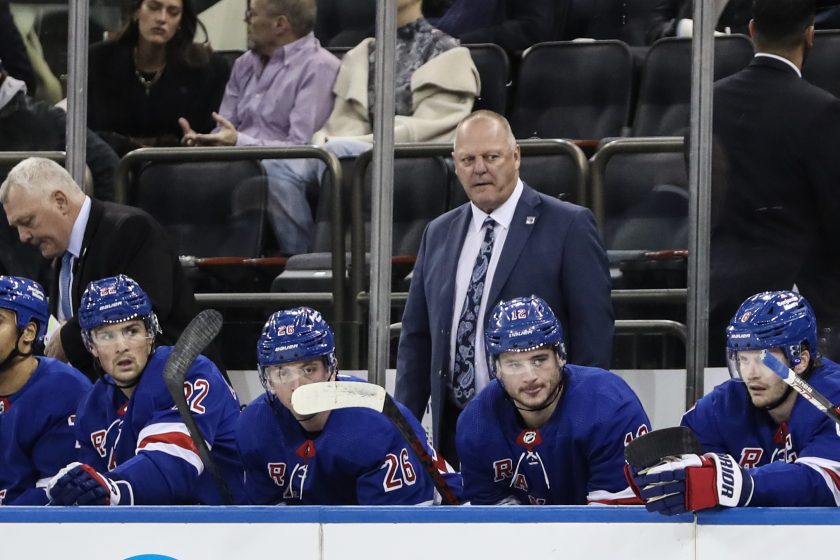What to expect from new Rangers coach Gerard Gallant

[sc name=”leenaminbanner” ]
Gallant will bring a new style of hockey to New York as the Rangers’ window begins to open.
On Monday, it was reported that the New York Rangers were set to name Gerard Gallant their next head coach. It was made official on Wednesday.
It’s official.
Welcome to Broadway, Coach Gallant! It’s been waiting for you. pic.twitter.com/yJn1WV6zMo
— New York Rangers (@NYRangers) June 16, 2021
The 57-year-old won the gold medal at the World Champions as coach of Team Canada just a few weeks ago. Gallant was fired by the Vegas Golden Knights in Jan. 2020.
In 541 games as the coach of the Columbus Blue Jackets, Florida Panthers, and Golden Knights, respectively, Gallant was 270-216-51 with a playoff record of 18-15.
Gallant was regarded as one of the best available head coach candidates and everyone in the hockey world is familiar with him and the success that he’s had throughout his coaching career, even though he does come with some red flags.
So what should the Rangers as well as their fanbase expect from Gallant and how does he differ from David Quinn?
Over the years, we’ve seen that Gallant is able to connect with veteran players as well as youngsters.
We first saw him do so in Florida where he was instrumental in developing a young Aleksander Barkov, Aaron Ekblad, and Jonathan Huberdeau while contributing to the success of the great Jaromír Jágr who, at the time, was in his 40s.
Speaking of Jágr, he spoke to the New York Post about Gallant and what he brings to the table and many of his quotes are noteworthy for us to look at.
“He is tough but friendly and he is honest… not only to the top guys but with everyone, no matter who you are,” Jágr said.
“It’s going to be good for the players, and the star players are going to like it because he knows how to relate to them… And the reason for that is that he was a very good player, he was a star in the NHL, playing with a star like Stevie Yzerman… So he knows what the stars need. Nobody can really tell you that. It’s something you have to feel. It’s something you have to know. You need the personal experience. That’s a big advantage.”
One of the reasons Quinn was likely fired was that he seemed unable to connect with the veterans, especially in his final season.
As a college coach who was in his first NHL stint, he couldn’t relate to his star veterans such as Artemiy Panarin and Mika Zibanejad.
He developed several of the team’s youngsters well, but the Rangers are at the point where they need a coach who can continue to develop the kids while getting through to the star players.
Nothing is more important when a team is getting ready to contend. We know that Gallant is capable of doing both, as he did in Florida.
Jágr went on to say, “He knows what the stars need, but if they are not playing well, it doesn’t matter who they are, they won’t get the normal ice time…”.
Some more praise from Jágr: “He doesn’t change lines that often… He doesn’t mix up things just to do something.”
What Jágr says here is almost the antithesis of what we saw from Quinn in New York. Quinn drew criticism on many occasions for sticking with the top guys even when they weren’t producing and neglecting to play the youngsters.
Rangers fans will find it refreshing to hear that Gallant doesn’t care about names and will bench any player that isn’t getting the job done.
“He doesn’t judge players by whether they’re old or young. It’s about whether he can trust you as a player.”
Rangers fans are probably most excited to hear that Gallant doesn’t switch up his lines often. Most fans will say that Quinn’s readiness to change the lines annoyed them more than anything.
If a line was deployed and didn’t make an immediate impact, Quinn would change things up. Patience, in that regard, wasn’t something he seemed to have much of.
In terms of his weaknesses, Gallant has been criticized with regard to installing systems and being a good in-game manager.
Here’s what Jágr had to say about it: “In my opinion [installing systems] is not the most important quality for a coach. The most important thing, the way I see it, is getting the players to trust you and play hard for you and believe in you.”
The hope is, obviously, that what Jágr says is true. That the players having faith and trust in Gallant will be enough.
However, this is proof that the assistant coaches Gallant surrounds himself with will be incredibly important. He’s going to need the help of those who are detail-oriented and are responsible for devising strategies and focusing on the details.
It’s become common knowledge that Gallant is traditional and hasn’t exactly been willing to turn to analytics, something that was an issue in Florida and Vegas.
This is particularly interesting given the fact the new general manager of the Rangers, Chris Drury, is very pro-analytics and believes the use of data in hockey is important.
In this case, we could expect to see Gallant to have a bench of coaches who do use analytics in coming up with game plans and making decisions.
The Florida team that Gallant coached is comparable to this Rangers team and allows us to get an idea of what to expect.
In Florida, Gallant had a line comprised of Jágr, Barkov, and Huberdeau. This team, and line, produced at a very high rate, even though the Panthers didn’t generate a particularly large amount of shots.
We also know that Gallant likes his teams to play fast-paced hockey. His players use all of the ice and everyone is always moving.
To Gallant, breakouts are important, as we saw with his Golden Knights. The goal is for the players to get up the ice as fast as possible. This is obviously high-risk and results in turnovers, but can be very rewarding.
Evidently, we should expect to see the Rangers play a completely different style of hockey. Gallant is the opposite of Quinn, who always played it safe and never wanted his players to do anything that could cost them in the long run.
Questions about toughness and grit surrounded this Rangers team this season, especially towards the end. Gallant might just be the ideal fit for this kind of situation because he has always liked tough and gritty players and has always valued them.
So he could give the front office recommendations of players with the factor of toughness that he’d like to see on the Rangers.
However, drama has followed Gallant because of his involvement in roster construction. He has gained a reputation for causing issues with front offices because he meddles in building rosters and believes he should have a say in player evaluation.
The good news is that this is a young and promising Rangers team with few serious issues. It’s hard to envision Gallant growing upset because of what he sees.
This season, questions about culture and the locker room came up on more than one occasion, beginning with defenseman Tony DeAngelo being dismissed from the team after engaging in an altercation with goaltender Alexandar Georgiev.
Quinn clearly meant a lot to many players on this team, especially guys like Pavel Buchnevich, who took a huge step forward under Quinn, but we don’t know if he was able to command the respect of all of his players at all times.
It’s difficult to believe that the DeAngelo-Georgiev incident would have happened under Gallant’s watch.
Gallant’s former teammate Ron Duguay said that Gallant is a good presence in the locker room: “He knows how to speak to a young player and knows how to speak to a veteran”.
Gallant is far from perfect. It’s probably consensus that someone like Carolina Hurricanes head coach Rod Brind’Amour would have been a more favorable choice.
However, we know that Gallant has achieved success as a head coach and that his players almost always love him.
The Rangers will likely be a better team with an experienced and seasoned coach like Gallant at the helm, but is he the long-term solution? Will he be the guy to bring the Stanley Cup back to Madison Square Garden for the first time in over 25 years?
Leen has written about the MLB, NBA, NFL, NHL, and international soccer. She is currently the primary NHL writer for ESNY. Leen's work has been featured on Bleacher Report and she was formerly a contributor for FanSided's New York Mets blog, Rising Apple. She is a co-host of the Yankees-Mets Express podcast.






